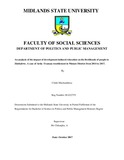Please use this identifier to cite or link to this item:
https://cris.library.msu.ac.zw//handle/11408/4095| Title: | An analysis of the impact of development-induced relocation on the livelihoods of people in Zimbabwe : a case of Arda -Transau resettlement in Mutare District from 2014 to 2017. | Authors: | Musikambesa, Chido | Keywords: | development-induced relocation livelihoods of people |
Issue Date: | Oct-2017 | Publisher: | Midlands State University | Abstract: | Many countries in the world have embarked on development projects such as mining, dam construction, urban development and population distribution schemes as a way of speeding up economic development and aiming at improving the living standards of citizens. Most of the development projects require large tracts of land which has resulted in the relocation of indeginous communities. Development-induced relocation has both positive and negative impacts on the livelihood of the displaced people basing on the way which they have been carried out. The purpose of this study was to analyze the impact of development induced relocation on the livelihood of people in Zimbabwe, in a case of Arda-Transau from 2014 to 2017. The research findings revealed that the relocation of Chiadzwa people had more of negative impacts than positive on their livelihood comparing to the way they lived before relocation. This was due to poor compensation for the loss of assets and loss of means of living which was worsened by the failure of mining companies to fulfill promises which were aiming at improving living standards of the displaced. It was noted that although mining promotes national economic development in Zimbabwe, the relocated community is less benefiting from the wealth of their land and it created a new form of poverty to the displaced. The research findings also indicated challenges faced by the relocated people in Arda Transau and roles played by state and non-state actors in improving livelihoods of the displaced. The study employed mixed methods approach where both qualitative and quantitative techniques were used in obtaining data, presentation and analysis. Questionnaires, In-depth interviews, research and observations were used for data collection. The researcher also observed ethical consideration during the research. The research findings led to the conclusion that to reduce the negative impact of development induced relocation the government and development partners should place the human needs at the centre and aiming at improving the living standards of the displaced to be better than before relocation. Different recommendations were noted and these include compensation for the displaced for their lost assets and improved social service delivery by development partners. Also, mining companies to increase in promoting the social corporate responsibility toward the displaced people. | URI: | http://hdl.handle.net/11408/4095 |
| Appears in Collections: | Bachelor Of Science In Politics And Public Management Honours Degree |
Files in This Item:
| File | Description | Size | Format | |
|---|---|---|---|---|
| CHIDO FINAL #####2017.pdf | Full Text | 2.11 MB | Adobe PDF |  View/Open |
Page view(s)
138
checked on Feb 26, 2025
Download(s)
146
checked on Feb 26, 2025
Google ScholarTM
Check
Items in MSUIR are protected by copyright, with all rights reserved, unless otherwise indicated.


